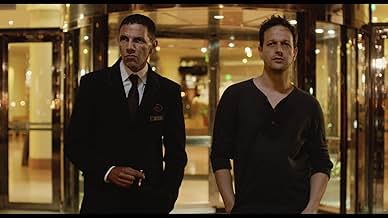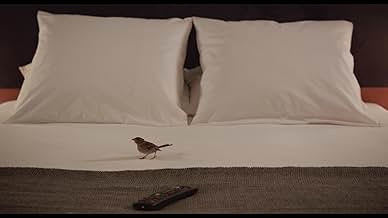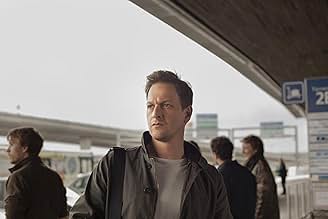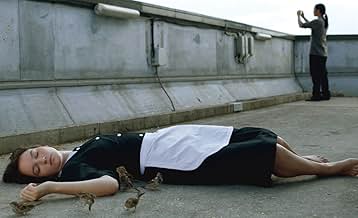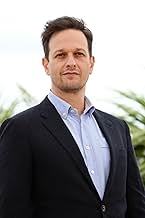AVALIAÇÃO DA IMDb
6,1/10
3,3 mil
SUA AVALIAÇÃO
Adicionar um enredo no seu idiomaIn an airport hotel on the outskirts of Paris, a Silicon Valley engineer abruptly chucks his job, breaks things off with his wife, and holes up in his room. Soon, fate draws him and a young ... Ler tudoIn an airport hotel on the outskirts of Paris, a Silicon Valley engineer abruptly chucks his job, breaks things off with his wife, and holes up in his room. Soon, fate draws him and a young French maid together.In an airport hotel on the outskirts of Paris, a Silicon Valley engineer abruptly chucks his job, breaks things off with his wife, and holes up in his room. Soon, fate draws him and a young French maid together.
- Prêmios
- 2 vitórias e 6 indicações no total
Rojda Mohamed-Guedouar
- Passagère RER
- (as Rojda Mohamed)
Grégoire Taulère
- Passager RER
- (as Grégoire Aubouy Taulère)
- Direção
- Roteiristas
- Elenco e equipe completos
- Produção, bilheteria e muito mais no IMDbPro
Enredo
Você sabia?
- CuriosidadesThe crew had to hatch sparrow eggs and raise them in preparation for the shooting, where eventually about 20 sparrows took part.
Avaliação em destaque
In a letter to Lou Andreas-Salome, the German Poet Rilke wrote, "The bird is a creature that has a very special feeling of trust in the external world, as if she knew that she is one with its deepest mystery." Using magic realism together with impressive camera work and CGI effects, Bird People reflects that mystery and turns it into a persuasive allegory of transformation. Directed by Pascale Ferran (Lady Chatterley) from a screenplay by Guillaume Bréaud, the film not only observes the alienation that exists in modern society, but goes beyond that to challenge our comfort level and glimpse what is possible.
Bird People depicts the lives of two very different people, Audrey (Anaïs Demoustier, The New Girlfriend), a maid at the Paris Hilton hotel in Paris close to the Charles de Gaulle Airport, and Gary Newman (Josh Charles, The Good Wife), a Silicon Valley engineer who is stopping overnight at the same hotel for a business conference en route to Dubai. Though they exist in totally different worlds, they are both stuck in life situations that are far from being nurturing. Neither can see a way out, until they do. As the film opens, the camera randomly peeks into the mind of travelers walking through airport terminals, riding on a commuter train or bus, enmeshed in their own world of smartphones, headphones, or simply daydreams.
There are no artistic or poetic visions in their thoughts, only internal conversations about appointments to keep, files to download, what to make for dinner, and other day-to-day minutia. Reminiscent of the Norwegian film, Oslo, August 31st, the people in the prologue have nothing to do with the stories that follow, but suggest that the difference is only in the level of awareness. Narrated by Mathieu Amalric who makes only a brief appearance in the film, the first hour concentrates on Gary (Charles), in Paris overnight and scheduled to leave the next day for Dubai. After experiencing a serious anxiety attack during the night, he makes some life-altering decisions the next morning.
Though his decisions appear to be impulsive, Gary tells others that he had thought about it for a long time. In a sudden one broom sweeps all move, he decides not to make the flight to Dubai, quits his job to the dismay of his business associates, and sells his stock to his partners. As if that wasn't enough housecleaning for one day, he tells his wife (Radha Mitchell, Silent Hill) that he is leaving her and the children, seemingly with little concern for their emotional consequences, though Ferran does not judge his actions, but simply records them. This "breakup" occurs in a face-to-face encounter during a stretched-out fifteen-minute Skype call, a process that is emotionally draining both for the characters and the viewer.
When pressed for a reason for his action, all he can come up with is that he "can't take it any longer" and has "had enough." Looking depressed and disheveled without any plans for the future, we fear for his life but Gary isn't ready to take any irrevocable steps of that nature, content to free himself only of his worldly responsibilities. Fortunately, the mood shifts as the second hour focuses on Audrey, a housekeeper at the hotel, as she goes about her routine of meticulously cleaning each room. Though in outward appearance, she is cheerful, there is a hint of an inescapable boredom and ennui in her life. Her only contact with people is to listen in on hallway conversations and sift through a guest's belongings in their room looking for a connection or an insight into who they are.
Peering into the windows of apartments across the courtyard with people living disconnected lives, she is again reminded of her sense of separation. What transpires, however, has nothing to do with her job, her family, or friends. It is a lovely flight of fancy that is too enchanting to reveal but includes an inspired Japanese artist, Audrey's discovery of a personal matter concerning the hotel concierge, all this amidst swooping aerial camera shots that lift the film from the stuffy hotel rooms and let it breathe. The trajectory of the film mirrors the words of the German poet Rilke, "If I don't manage to fly, someone else will. The spirit wants only that there be flying." In that regard, Bird People soars.
Bird People depicts the lives of two very different people, Audrey (Anaïs Demoustier, The New Girlfriend), a maid at the Paris Hilton hotel in Paris close to the Charles de Gaulle Airport, and Gary Newman (Josh Charles, The Good Wife), a Silicon Valley engineer who is stopping overnight at the same hotel for a business conference en route to Dubai. Though they exist in totally different worlds, they are both stuck in life situations that are far from being nurturing. Neither can see a way out, until they do. As the film opens, the camera randomly peeks into the mind of travelers walking through airport terminals, riding on a commuter train or bus, enmeshed in their own world of smartphones, headphones, or simply daydreams.
There are no artistic or poetic visions in their thoughts, only internal conversations about appointments to keep, files to download, what to make for dinner, and other day-to-day minutia. Reminiscent of the Norwegian film, Oslo, August 31st, the people in the prologue have nothing to do with the stories that follow, but suggest that the difference is only in the level of awareness. Narrated by Mathieu Amalric who makes only a brief appearance in the film, the first hour concentrates on Gary (Charles), in Paris overnight and scheduled to leave the next day for Dubai. After experiencing a serious anxiety attack during the night, he makes some life-altering decisions the next morning.
Though his decisions appear to be impulsive, Gary tells others that he had thought about it for a long time. In a sudden one broom sweeps all move, he decides not to make the flight to Dubai, quits his job to the dismay of his business associates, and sells his stock to his partners. As if that wasn't enough housecleaning for one day, he tells his wife (Radha Mitchell, Silent Hill) that he is leaving her and the children, seemingly with little concern for their emotional consequences, though Ferran does not judge his actions, but simply records them. This "breakup" occurs in a face-to-face encounter during a stretched-out fifteen-minute Skype call, a process that is emotionally draining both for the characters and the viewer.
When pressed for a reason for his action, all he can come up with is that he "can't take it any longer" and has "had enough." Looking depressed and disheveled without any plans for the future, we fear for his life but Gary isn't ready to take any irrevocable steps of that nature, content to free himself only of his worldly responsibilities. Fortunately, the mood shifts as the second hour focuses on Audrey, a housekeeper at the hotel, as she goes about her routine of meticulously cleaning each room. Though in outward appearance, she is cheerful, there is a hint of an inescapable boredom and ennui in her life. Her only contact with people is to listen in on hallway conversations and sift through a guest's belongings in their room looking for a connection or an insight into who they are.
Peering into the windows of apartments across the courtyard with people living disconnected lives, she is again reminded of her sense of separation. What transpires, however, has nothing to do with her job, her family, or friends. It is a lovely flight of fancy that is too enchanting to reveal but includes an inspired Japanese artist, Audrey's discovery of a personal matter concerning the hotel concierge, all this amidst swooping aerial camera shots that lift the film from the stuffy hotel rooms and let it breathe. The trajectory of the film mirrors the words of the German poet Rilke, "If I don't manage to fly, someone else will. The spirit wants only that there be flying." In that regard, Bird People soars.
- howard.schumann
- 28 de fev. de 2015
- Link permanente
Principais escolhas
Faça login para avaliar e ver a lista de recomendações personalizadas
- How long is Bird People?Fornecido pela Alexa
Detalhes
- Data de lançamento
- País de origem
- Central de atendimento oficial
- Idiomas
- Também conhecido como
- Kuş İnsanlar
- Locações de filme
- Empresas de produção
- Consulte mais créditos da empresa na IMDbPro
Bilheteria
- Orçamento
- € 6.500.000 (estimativa)
- Faturamento bruto nos EUA e Canadá
- US$ 32.111
- Fim de semana de estreia nos EUA e Canadá
- US$ 7.443
- 14 de set. de 2014
- Faturamento bruto mundial
- US$ 866.211
- Tempo de duração2 horas 7 minutos
- Cor
- Mixagem de som
- Proporção
- 1.85 : 1
Contribua para esta página
Sugerir uma alteração ou adicionar conteúdo ausente

Principal brecha
By what name was Bird People (2014) officially released in Canada in English?
Responda


